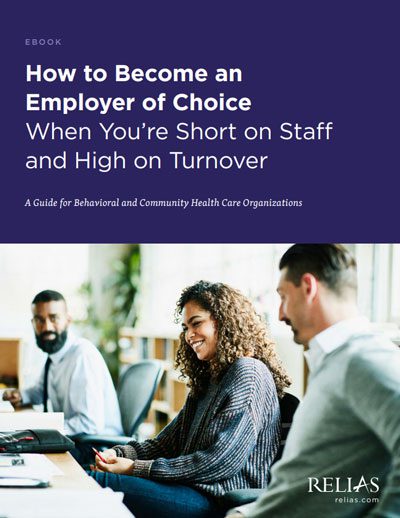Healthcare organizations, including those in behavioral and community health settings, struggle to attract and hire highly qualified physicians, medical assistants, nurses, counselors, psychiatrists, social workers and even administrative staff. But once you do get candidates through the door and into your hiring process, are you following best practices when it comes to the interview? Do you know what questions to ask in a healthcare interview?
Seemingly neutral interview questions can get your organization or facility into hot water if you aren’t careful. In fact, 85% of organizations are guilty of asking inappropriate interview questions. To avoid these types of questions, we’ve put together a list of best practices for interviewing that healthcare organizations can follow.
Interviewing best practices for behavioral and community healthcare organizations
Do everything you can to avoid putting your organization at risk. Here’s how:
- Regularly communicate hiring best practices to your managers and others involved in the process
- Share best practices via email so they can be referenced when needed
- Save resources in a shared location or company intranet
- Emphasize interview questions not to ask and advise staff of the consequences to them and the organization
14 questions to ask (and not ask) in a healthcare interview
The table below is a helpful tool your staff can use to prepare for an interview. It includes interview questions to ask in a healthcare interview, as well as those that should be avoided. These questions can help you get the information you need without opening your organization to discrimination or liability claims. Please note that this list is not all-inclusive.
Instead of This |
Ask This |
| How many children do you have? | What days and hours are you able to work? |
| How old are your children? Or: What arrangements do you have for child care? | Do you have nonwork-related responsibilities what will interfere with specific requirements for the job? |
| What is your religion? Or: Will you need personal time for particular religious holidays? | Are there specific times that you cannot work? |
| Do you own a car? | Do you have a reliable method of transportation to get to work? |
| What is your national origin? Or: Where did you live while growing up? | Are you legally eligible to be employed in the United States? |
| What is your maiden name? | Have you ever been employed under a different name? |
| Do you have any disabilities? | Can you perform the duties of the job for which you are applying? |
| What is the name and address of a relative to be notified in case of an emergency? | What is the name and address of a person who can be notified in case of an emergency? (Inquire only after individual has been hired.) |
| Are or have your wages ever been garnished? | Credit references can be used if in compliance with the Fair Credit Reporting Act of 1970 and the Consumer Credit Reporting Reform Act of 1996. |
| What type of discharge did you receive from the military? | What type of education, training and job-related work experience did you receive in the military? |
| What is your native language? Or: Is English your first language? | What languages do you speak and write fluently? (Only ask if the job requires additional languages.) |
| How would you like to be addressed—Mr., Mrs., Miss or Ms.? | Ask only if there is a genuine occupational qualification. |
| Do you own your own home? | How long have you resided at your current address? What was your previous address? How long did you live there? |
| When did you graduate from high school or college? | Do you have a university or college degree, a high school diploma or equivalent? (Ask only if relevant to job performance.) |
Do you ask the right questions?
Communicating and enforcing interviewing best practices to staff who conduct interviews might seem like a hassle, but the time you dedicate to it will pay off in the long run. Not only will you safeguard your behavioral or community healthcare facility from claims of discrimination or hiring bias, you will also create a positive and safe hiring process for candidates and future employees.

Free Guide: How to Become an Employer of Choice When You’re Short on Staff and High on Turnover
The staff shortage crisis and soaring turnover rates in the healthcare industry is creating a demand for employers to re-examine the way they attract, hire, onboard and develop staff. This guide—complete with worksheets and practical tools—includes four actionable steps behavioral and community health centers can take to improve current strategies and become an employer of choice.
Download the Guide →





